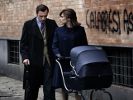Eye For Film >> Movies >> Piazza Fontana: The Italian Conspiracy (2012) Film Review
In December 1969, after a year of escalating conflict between police and protest groups, a bomb exploded in the Banca Nazionale dell'Agricoltura in Milan's Piazza Fontana. 17 people died as a result, with a further 88 wounded. With three more bombings the same day, there was uproar. In order to keep order, it was imperative that the police be seen to do something. What they did do, however, was to lead the country into still darker territory, especially as questions began to be asked about just who was really responsible for the deadly explosions.
Marco Tullio Giordana's film, loosely based on Paolo Cucchiarelli's book about the bombings, follows the story from the pont of view of troubled police commissioner Luigi Calabresi (Valerio Mastandrea), a man whose desire to do the right thing is matched only by his fear of the consequences. A believer in engagement rather than aggression, rapport rather than interrogation, Calabresi is a man who gets results. He's made a lot of useful allies and it's easy to see how his methods have helped him to climb within the service, uncovering information impossible to access with cruder methods.

But these are troubled times and the disorder on the streets extends within the service itself. The legacy of Il Duce hangs heavily in alleyways and plazas, meeting rooms and ballrooms alike; fascists battle anarchists and violence is never far beneath the surface. A left wing group still sees revolution as a real possiblity. A right wing group conspires to bring an ousted prince to power. In thse shifting waters, Calabresi gets out of his depth.
Unfortunately, so does the uneducated viewer.
Piazza Fontana has been a massive hit in its native nation, and unsurprisingly so. It has style, it has grit, and it has a moral ambiguity too little acknowledged in real life politics. Most importantly, it tells a familiar tale well. But as an export, it is not so successful; unless you are already familiar with the history of the period you may find parts of it hard to follow and low on emotional impact. The non-Italian viewer lacks the pre-existing sense of outrage that underscores the twisting plot. Though Mastandrea is strong as always, his character spends part of the story in a state of emotional numbness that makes him difficult to engage with. The admiable moral distance that the film keeps from certain key events may leave viewer without pre-existing opinions stranded.
That said, Piazza Fontana remains an effective mystery thriller with plenty of curious notes to intrigue the general viewer. As in David Fincher's Zodiac the fact parts of the case were never solved becomes a strength, not a weakness. As in that film, there is a focus here on obsession, but it has its roots in a different place - perhaps in guilt. With parts of the background story resembling Italy's troubles today, this is a timely look at the unlearned lessons of history.
Reviewed on: 11 Apr 2013


















